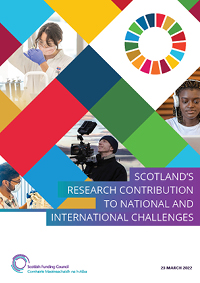SFC news published since 2018. See SFC archived content for earlier news articles.

The impact of research carried out in Scottish universities is highlighted in a new report published today by the Scottish Funding Council (SFC).
The report looks at research that contributes to the United Nations’ 17 sustainable development goals. The goals are part of the international 2030 Agenda for Sustainable Development, described by the UN as a blueprint for peace and prosperity for people and the planet.
Each of Scotland’s universities undertakes sustainable development research, often in partnership with institutions and agencies in other countries. Six Scottish universities appeared in the top 200 in the most recent world rankings of universities’ contribution to the UN goals. The rankings cover 94 countries and include 1,118 universities.
Scottish research has contributed particularly to the UN goals of ending hunger; improving clean water and sanitation; ensuring affordable and clean energy; and addressing climate change.
Amongst the examples in the report is a pioneering project led by the University of Aberdeen to develop a disease resistant rice crop, and the part researchers from Queen Margaret University played in treating and preventing COVID-19 in Gaza and Lebanon. Case studies also include work carried out at the University of St Andrews to protect whales from the impact of naval sonar, and a project at Heriot-Watt University to create a smart energy island.
Today’s report also highlights the effect university research has on Scotland’s National Performance Framework with case studies that illustrate the benefits being achieved in key areas such as health, the environment, social justice and fair work.
Minister for Higher and Further Education Jamie Hepburn said:
“University research drives forward the improvements and innovations needed to help us reach our economic, societal and environmental aims.
“This report highlights the value and scope of our research base, and the international recognition Scotland receives as a key partner in solving global challenges.”
Mike Cantlay, Chair of the Scottish Funding Council, said:
“Today’s report paints an incredibly clear picture of the impact research carried out here in Scotland has on communities both here and throughout the world. Its benefits extend to the health of the planet’s oceans and, crucially, to the creation of a carbon-free future.
“By contributing so strongly to the UN’s Agenda for Sustainable Development, our universities are helping to enhance Scotland’s international reputation and strengthen our relationship with other countries.”

